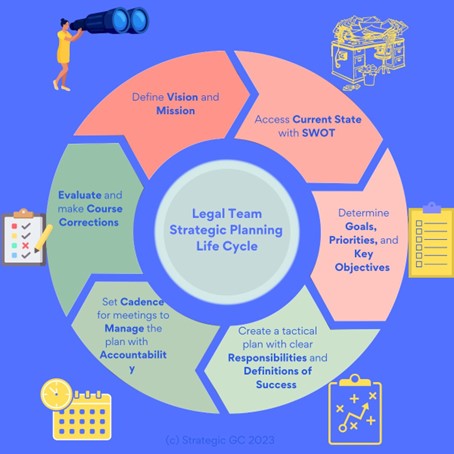KEY TAKEAWAYS:
- Strategic planning is an effective way to begin improving your team’s contract management process.
- Refer to the visual below and the four sessions outlined in this article as a guide.
- Generally, the more complex plans need more frequent meetings in order to keep on track.

Wherever you are in your contract management journey, you can level-up your effectiveness by learning and using key Strategic Planning principles.
Even better, wherever you are in your long list of contracts to review before quarter-end or need to restructure your contract review process, you can regain some purpose and inspiration by working on areas of Strategic Planning.
This article presents four strategy sessions that leaders can use to facilitate strategic discussions around better contract management. Each strategy session below has a suggested agenda and homework assignments for the team.
For best results, I recommend scheduling several 30-minute meetings with your team to review each session (even if you are the whole team). Space these sessions at least one week apart to build in reflection time and try to complete all sessions in less than two months.
Session 1: Getting Started
- Review this infographic. This cycle may be familiar to you if you have a robust contract life cycle system. Note that the descriptions in each part of the circle are very different from contract life cycles.

- Reflect on your Vision for your contracts/legal department. Where do you aspire to be in 3-5 years? What do you want your team to be known for in 3-5 years? Maybe you want to implement a robust contract management system. If so, what can you do now to help you build your case to invest in that system? A shared Vision will help you find inspiration in your work.
- What is your Mission? This is your Purpose and answers the question of “Why are we doing what we are doing? Why is my team doing this instead of another team? This can aid your discovery of where you uniquely add value.
- Finish this session by quickly reviewing the Current State. Does the cluttered desk seem familiar? SWOT means Strengths, Weaknesses, Opportunities and Threats. Your homework is to reflect on the SWOT of your team.
Session 2: SWOT
- Identify your team’s SWOT. SW are usually “internal” meaning your team can influence adjustments. OT are usually “external” meaning your team has less control over how they change yet your team can anticipate changes.
- Strengths. What does your team do well and how can you become even stronger? Maybe you excel in quickly reviewing a certain type of contract that enables quick sales. Maybe you work well with inventors to patent new ideas. Maybe you collect contract data that can be analyzed to improve customer relationships and quicken renewals.
- Weaknesses. Where can your team improve? Are there new or expanding areas of law impacting your company that merit more training? Do some business teams need more training to better protect confidential materials? Do you need to create a systematic way to receive requests for contract/legal support?
- Opportunities. What is going on in the company, industry, region, world, etc. that your team can pivot towards? Maybe HR deployed a training system that can be a new platform for contract training. Maybe a new IT system can be explored to automate one or more parts of your contract management system. Maybe the uptick in a certain part of the business will likely result in more requests for a certain type of contract and your team might create an updated contract template.
- Threats. Think about this as the converse of Opportunities. Do you expect budget cuts will result in less outsourcing of certain contract work and if so, what will be the impact to contract cycle time?
- Compare your Current State to your Vision. What are the activities that will move you closer to your Vision?
- Your homework is to reflect on these and narrow this list to one, two, or three items to focus on.
Session 3: Define Success
- How will you define Success? Once your team has aligned on the key priorities of focus, be clear on what your goal is and how you will define success. Your definition of success (DOS) is best if you measure what you can control. So, in our example, one DOS is having consistent data over a six-month period. Ideally, the DOS is to stop reviewing these contracts and this requires agreement with your manager and business partners.
Start with something that you believe you can achieve in the next 8-12 months, considering all of your other current responsibilities. Less is more to build the muscle of Strategic Planning.
For example, let’s say that low-legal risk contracts distract your team from high-value contract reviews. Your objective is to convince the business teams going to restaurants and hotels to review these contracts without coming to your contracts/legal team. You need a plan to move from current state to the future. Maybe your plan includes these steps:
- Identify the contracts by type/name. For example, all one-off hotel and restaurant contracts.
- Team to complete by April 28.
- Data collection. How many of these contracts come to your team and from what departments? What other data do you want to collect? For example, you may want to identify the key business risks that merit review such as cancellation provisions. E.g.,[Name] to complete system to capture this data (e.g., Excel) by May 12. Team to start using system for 6 months.
- Data analysis. Review the data as a team and determine next steps.
- Next steps. The next steps might include reporting to your manager and making a recommendation to stop reviewing these contracts. It might include training your business on how to review these contracts to minimize business risks.
Session 4: Implement
- Establish a cadence of meetings to review and manage your Strategic Plan. Generally, the more complex plans need more frequent meetings in order to keep on track. In these meetings, your team can report on their progress, seek help, share ideas, etc.
- Develop the update and recommendation to your manager with your new Strategic Plan if you have not already.
- Schedule a specific meeting several months out to evaluate your team’s efforts and make any course corrections.
You can use Strategic Planning to achieve various team goals, from better contracting, improved templates, third-party template reviews, to more!

















